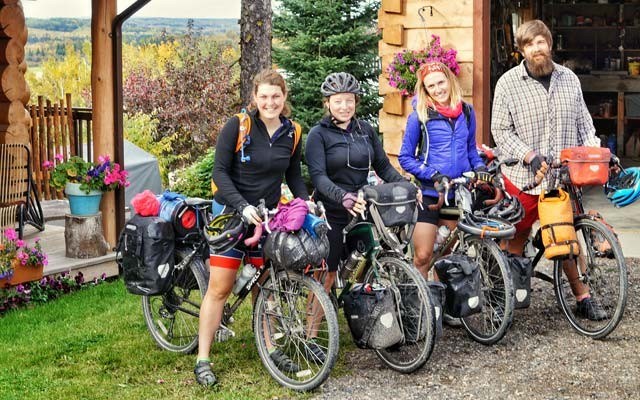When Patrick Wanninkhof was killed by a distracted driver while on a charity ride last summer, his family and friends knew they had to act to honour him.
His sister, Suzette, and partner Rachel Hartsell, teamed up with two other friends, Greg Powell and Megan Ryan to ride in his memory. Patrick Rides On 8000 is cycling nearly 13,000 kilometres (or 8,000 miles), having started in Deadhorse, Alaska on July 31 with the goal of making it to the Wanninkhofs' home in Key West, Fla. The journey, which meandered into Whistler on Sept. 26, will take them through Washington, Oregon, California, Arizona, New Mexico, Texas, Louisiana, Mississippi and Alabama before they hit the Sunshine State.
Wanninkhof, a New York City teacher, was killed in Oklahoma last July while on a charity ride supporting Bike and Build, a non-profit supporting sustainable housing.
His sister and partner came up with the idea for the ride, but acknowledged getting pushback after making their decision.
"When Rachel and I originally announced we were first going to do this trip, we were met with a ton of resistance," she recalled. "People were always like, 'Your brother was killed on a bicycle,' 'Your boyfriend was killed on a bicycle, how in the world do you validate going on a bicycle?'
"My response was 'How could we not? How could we let a tragedy take away from something good? How could we stop riding?' The biggest challenge is convincing people that bicycling is inherently safe. Phone use and driving isn't. We're not making a risky choice. The woman who killed Patrick was."
Wanninkhof said the highlight of the trip has been realizing the kindness of strangers, which came to them early in the ride in the Yukon Territory.
"What really sticks out is how kind and giving people have been once... on the road. We met this one couple at a bakery for two minutes outside of Haines Junction. One of our riders had a mechanical problem so they drove him to Whitehorse. We got to Whitehorse and didn't have a place to stay and they said 'You have to stay with us.' We stayed with them for three days," she said. "They uprooted their lives for three days to let four smelly people stay in their basement.
"After Patrick was killed, you have lots of doubts about the way the world works. Things don't really seem as good when the person you live for is killed... Then we go on a trip like this and it restores that faith in people a hundred times over."
The sojourn itself has been a daunting one with the Stewart-Cassiar Highway in northwestern B.C. and especially the treacherous Dalton Highway on which they began their trek.
"We started out on the Dalton Highway, which is by some accounts the most remote highway in the world. It connects Fairbanks to Prudhoe Bay, Alaska. We started Day 1 of our trip in one of the most remote places in North America," Hartsell said. "The Dalton Highway is about 415 miles (666 kilometres) of mostly unpaved road, unregulated road... That was pretty insane. That was crazy. When I say it's unregulated, because it's not a commercial road, they are allowed to make roads as steep as they like, so we definitely went up some hills that I believe were above 15-per-cent grade."
Hartsell said the crew is approaching two months on the road, but with proper rest and friends coming along for stretches of the campaign to keep it fresh, they have the strategies in place to take them through to the road's end in February.
"It's really difficult to be on the road day after day biking but we've been really good about taking one day of rest every week, so six days of riding and one day off," she said. "It really comes down to teamwork, too. There's four of us, currently, although we have friends and family who are joining us for different parts of the way.
"The physical toll is helped in part by having strong support from each other on the team and externally as well. We sing songs to each other. We sometimes will carry each other's packs if it gets too hard. It's amazing what the human body can do."
The riders said the anti-distracted-driving message has come up organically in conversation with people along the way as opposed to being hammered home aggressively. Wanninkhof makes a plea for safer roads to everyone she meets.
"I say 'Now that we've met, now that we've had an interaction, I ask you personally for me, if you're driving, put your phone in the back seat on silent,'" she said. "There's a very different step between knowing something is bad and not doing it."
The riders are looking to secure accommodation for several stops along the rest of the way. Although some sites have been confirmed, they are still looking for a place to rest their heads in numerous locales.
For more information, visit www.pro8000.com.




